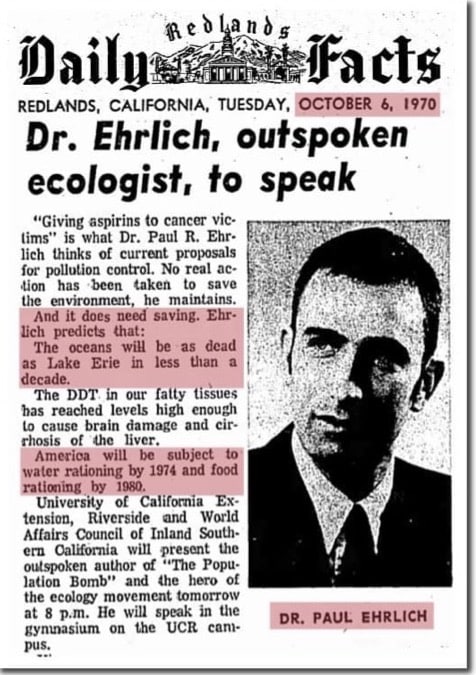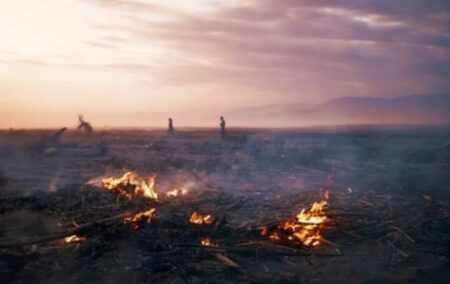The world has problems. Some are big problems. But stop believing people who for over fifty years peddled the lie that the planet, or civilisation, is doomed. That way, madness lies.
The reason that so many younger people are casting about for crazy political ideas like socialism to save the world from the status quo is that they have had it drilled into them, from birth, that the world is on a perilous course that will destroy either the planet, or civilisation, or both.
Boomers will die of old age, they say, but younger generations expect to die of ecological disaster and the collapse of civilisation.
Of course, the boomers and generation Xers never expected to die of old age, either. They expected to die of pollution, and war, and blamed their parents for the dire straits in which civilisation found itself. They became hippies and punks, rebelling against the ‘square’ older generations.
When we (generation X) were young, we were taught we lived in a polluted, over-populated world, breathing lead and carcinogens, running out of all manner of resources, and expecting worldwide famines even in the rich world.
On top of that, we faced ‘mutually-assured destruction’, which meant nuclear annihilation, a slow death by nuclear fallout, or nuclear winter. We held drills in schools to train for evacuation or hiding under desks in case of nuclear (or terrorist) attack.
Shit was real, as they say.
So, as someone who has been facing the end of civilisation for half a century, let me tell you, reports of the end of the world have been greatly exaggerated.
Yes, there were problems. The world really was very polluted. But we cleaned it up. The rich world, which became rich because of free-market capitalism, has cleaner water and air and healthier environments today than it has had in centuries. The poor world needs to catch up, on both scores.
The Cold War really did involve ill-disguised hostility, endless proxy wars and nuclear standoff. It was awful. But the liberal democracies of the West won that battle, too.
The danger of autocratic, war-mongering, corrupt and socialist governments persists, but if the Soviet Union of the 20th century could be beaten, then so can the threats of the 21st century.
We will always face problems, but casting them as apocalyptic, or inevitable, or insoluble without ripping the rug out from under civilisation and starting from scratch, is a recipe for pathological anxiety and the politics of despair.
Drumbeat of doom
Still, the drumbeat of doom persists. To ring in the new year, the popular CBS programme 60 Minutes ran an episode in which they interviewed scientists about the so-called ‘sixth mass extinction’.
Of course, there are pressures on wildlife, and on wild habitat, but as I wrote going on a decade ago, much of that involves making up the numbers and panicking.
And the protagonists of the show did not mince their words: ‘I and the vast majority of my colleagues think we’ve had it; that the next few decades will be the end of the kind of civilisation we’re used to’ said the Bing Professor Emeritus of Population Studies of the Department of Biology of Stanford University and President of Stanford’s Center for Conservation Biology.
He also said, ‘The oceans will be as dead as Lake Erie in less than a decade.’
The difference between those two statements is that the latter was said more than 52 years ago, on 6 October 1970.

The ‘time of famines’ is upon us, and ‘it is shockingly apparent that the battle to feed humanity will end in a rout’, he proclaimed in 1967, saying we have to hope that the world famines of the next 20 years will not lead to thermonuclear war and the extinction of the human species.
‘We must realise that unless we are extremely lucky, everybody will disappear in a cloud of blue steam in 20 years’, he was quoted as saying by the New York Times in 1969.
Ehrlich, together with his wife, Anne, and the future science czar in the administration of Barack Obama, John P. Holdren, published a book in 1977 called Ecoscience: Population, Resources, Environment, in which they toy with the idea of a ‘Planetary Regime’ that would impose strict population control measures, including limits on the number of children parents are allowed to have, forced abortions for single mothers, and sterilisation drugs added to drinking water or staple food supplies. (See here for some choice quotations.)
And yet, this same death cult leader and failed prophet of doom is featured in 2023 on 60 Minutes, pontificating about over-population and the collapse of civilisation, as if he had any credibility left.
Ice Age
‘Air pollution may obliterate the sun and cause a new ice age in the first third of the next century’ said James P. Lodge Jr., a scientist at the National Center for Atmospheric Research in Boulder, Colorado, in 1970. We would also run out of fresh water as well as oxygen, he predicted.
Particulate pollution could, in the next 50 years (that is, by 2021), screen out so much sunlight that the average temperature could drop by six degrees, which ‘could be sufficient to trigger an ice age!’, wrote S. Ichtiaque Rasool (1930-2016) Chief Scientist for Global Change at the National Aeronautics and Space Administration (NASA) and his climatologist colleague Dr. Stephen H. Schneider, in 1971.
Similar reports about global cooling were carried in the Washington Post, The Guardian, Time, and Newsweek, and landed on the desk of US president Richard Nixon on 3 December 1972. As late as 1978, the New York Times warned us that there is ‘no end in sight’ to the 30-year cooling trend.
This same Stephen Schneider infamously said in 1989 that scientists ‘have to offer up scary scenarios, make simplified, dramatic statements, and make little mention of any doubts we might have’.
Yet by 1992, Schneider had changed his tune, and now said ‘[T]he overall weight of evdence’ of global ‘warming’ is so clear that one begins to feel angry toward those who exaggerate the uncertainty.’
Acid rain
We were told that acid rain would cause widespread damage to forests and lakes, killing key ecosystems necessary for human survival. Melancholy songs were written about it. It was part of the anxiety we grew up with, as teenagers in the 1980s.
It wasn’t until 1990 that a $537 million, decade-long study commissioned by the US Congress concluded that acid rain should be considered a long-term problem requiring pollution controls, but that ‘it is not the environmental crisis some scientists have suggested’.
As long ago as 1988, we were warned that ‘sea level is threatening to completely cover’ the Maldives islands in the Indian Ocean ‘within the next 30 years, according to authorities’.
Thirty years later, the Maldives were building half a dozen new airports to accommodate all the tourists to the islands, which haven’t shrunk an inch.

In 1989, Noel Brown, director of the New York office of the United Nations Environment Programme, told the Associated Press that entire nations could be wiped off the face of the Earth by rising sea levels if global warming is not reversed by 2000, creating an exodus of eco-refugees. Africans would have to move to drier land, ‘but would you want to live in the Sahara?’ he asked. Canadian and US wheatlands would return to 1930s Dust Bowl conditions, he confidently predicted.
James Hansen, the former head of the Goddard Institute for Space Science at NASA, in 1989 predicted that New York’s West Side Highway would be under water around about now. It stubbornly remains ten feet above sea level.
No more snow
In 2000, Dr. David Viner, a senior research scientist at the Climatic Research Unit of the University of East Anglia (of #ClimateGate infamy), told the UK’s Independent newspaper that, ‘Children just aren’t going to know what snow is.’
Conversely, the Pentagon warned former US president George W. Bush in 2004 that Britain would be ‘Siberian’ in less than 20 years. Nuclear conflict, mega-droughts, famine and widespread rioting will erupt across the world, it predicted.
In 2002, George Monbiot, the chief alarmist at The Guardian, warned: ‘Famine can only be avoided if the rich give up meat, fish and dairy.’
Hansen, of West Side Highway fame, said in 2008, ‘We’re toast’, certain that the Arctic would be ice-free in summer in ‘in five to 10 years’. Al Gore, for his part, said it would be ice-free by 2013.
Come 2013, scientist Peter Wadhams said the Arctic would be ice-free in two years, heralding a ‘methane catastrophe’.
The Arctic has not been even close to ice-free since these predictions, and has recovered slightly from its all-time low in 2012.
Thirteen years ago, the former Batty Prince Charlie (now the king), took a minute away from his grand estates and palaces to tell the peasants that the price of capitalism and consumerism is ‘just too high’, and we have just 96 months to save the world. Those 96 months elapsed in July 2017. It was better than the UK’s then-prime minister Gordon Brown, however, who in the same year, 2009, said we have just fifty days to save the planet from catastrophe.
In 2008, the Forum for the Future, a research body committed to sustainable development, predicted that climate refugees would move to Antarctica by 2030, among other far-fetched ‘possibilities’.
And so on and so forth.
Progress
Yes, the world faces many problems, and some of them are indeed serious. They are never as catastrophic as the media, scientists, fund-raising NGOs or political leaders would have you believe, however.
Things certainly could be better than they are now, but they are in many ways also better, on the whole, than they have been in the past.
The latest IPCC forecasts show that expected warming by 2100 has been nearly halved in the last five years, and scenarios of climate doom are becoming implausible. The science simply does not support prognostications of apocalypse.
Humanity will not only muddle through, but as we become more prosperous, we will become better able to adapt to the threats that our environment poses to us, and better able to manage nature to be healthier and more productive.
The real risk to our future is impeding humanity’s growing prosperity. The longer poor countries remain poor, the less concern they will have for environmental niceties. The longer middle-income countries remain middle-income, the more vulnerable they will remain to changes in climate and bad weather.
Too late for too late
Ignore the doomsayers. They’ve been telling us it’s too late for over half a century. They’ve been wrong for over half a century. And even longer, if you go back to Malthus and his ilk. Predicting the end of the world is as old as human civilisation.
And yet here we are. Those who haven’t succumbed to climate anxiety are working to make the future of humanity even better than the past.
It’s too late to be telling us still that it’s too late.
The risks to humanity are not environmental; they are political and economic. What will harm humanity, threaten its prosperity, and implicitly damage the environment, is to believe the doomsayers and follow their siren-song of eco-socialism.
It’s time to treat them with the disrespect they deserve, instead of giving them prime-time slots on 60 Minutes.
[Photo: Fabian Schmiedlechner / EyeEm via Getty Images]
The views of the writer are not necessarily the views of the Daily Friend or the IRR.
If you like what you have just read, support the Daily Friend

